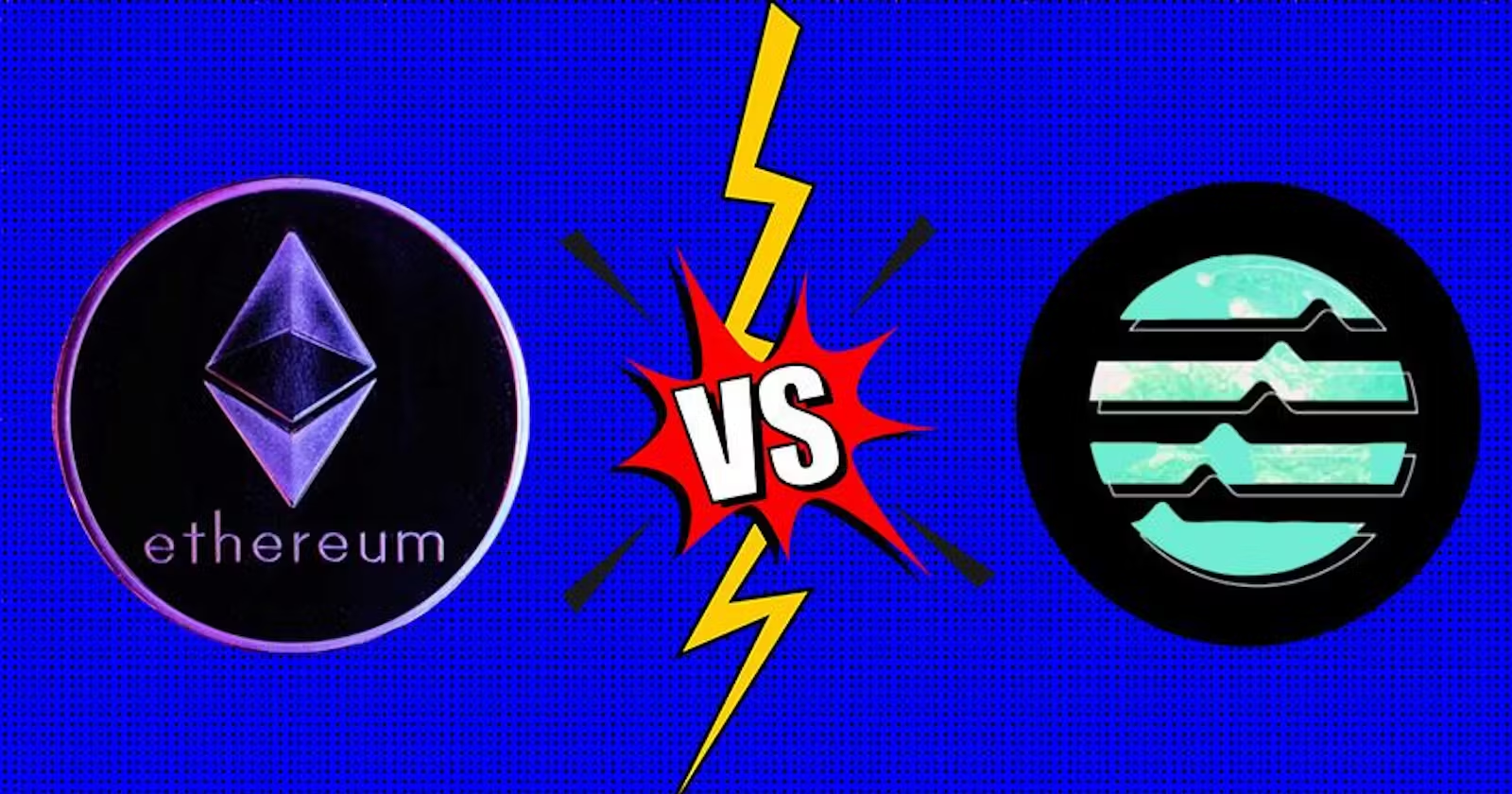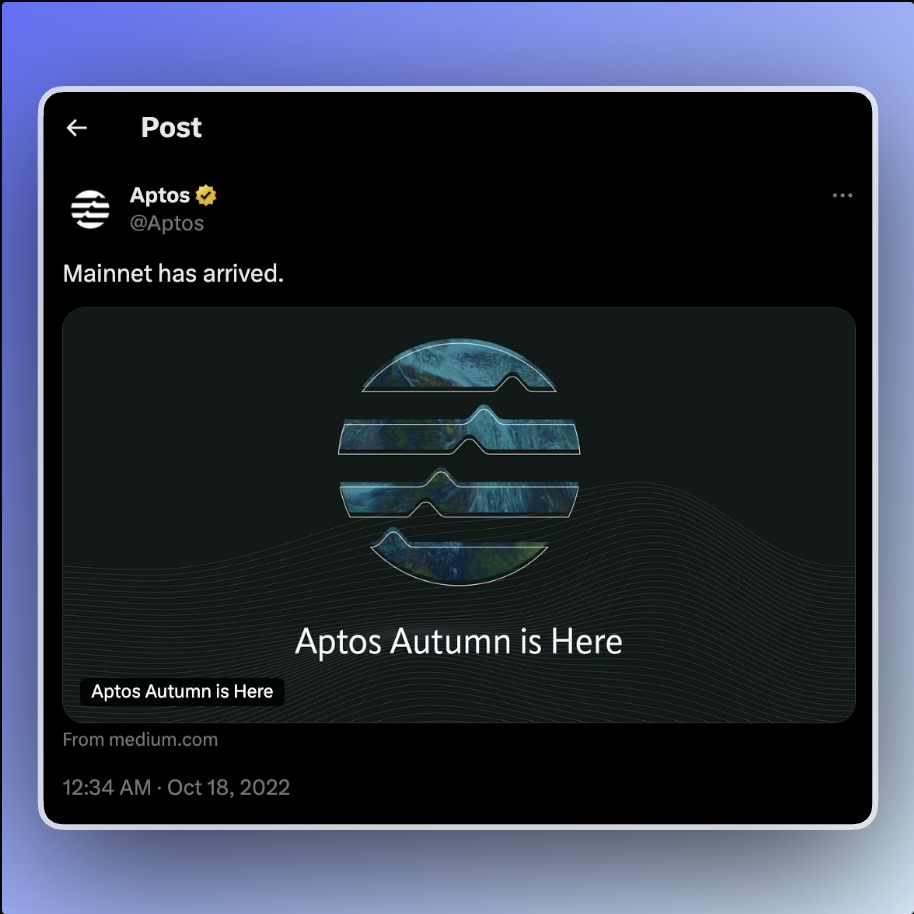Aptos vs EVM: A deep dive
 Aditya Khetarpal
Aditya Khetarpal
Introduction
Aptos and Ethereum are two significant players in the blockchain ecosystem, each offering unique features and capabilities that cater to different needs within the decentralized application (dApp) landscape. As the blockchain space continues to evolve, comparing these two platforms becomes essential for developers, investors, and users looking to understand their options in building and utilizing blockchain technology.
Background and History
History of Ethereum
Ethereum was proposed in late 2013 by Vitalik Buterin and development began in early 2014. The platform officially launched on July 30, 2015, introducing smart contracts and a decentralized virtual machine (EVM) that allows developers to create dApps. Over the years, Ethereum has undergone several upgrades, including the transition from Proof of Work (PoW) to Proof of Stake (PoS) with Ethereum 2.0, aimed at improving scalability and reducing energy consumption.
History of Aptos
Aptos (APT) is a Layer 1 blockchain that prioritizes scalability, security, reliability, and upgradeability. It originated from Meta's Diem and Novi projects. Mo Shaikh and Avery Ching, played pivotal roles in developing the Diem project, particularly in developing a crypto wallet called Novi Wallet.
The team recognized the potential of their technology, especially the Move programming language designed for blockchain development with a focus on security and data verification. Over time, Aptos introduced new features and established Aptos Labs to evolve Diem's core strengths and address regulatory challenges.
The Aptos mainnet was officially launched on October 17, 2022.

Consensus Mechanisms
Ethereum's Consensus Mechanism
Ethereum initially used PoW but transitioned to PoS with its Ethereum 2.0 upgrade. This change enhances security while significantly reducing energy consumption associated with mining.
Aptos Consensus Mechanism
Aptos employs a unique PoS mechanism that integrates Byzantine Fault Tolerance (BFT) to enhance security and scalability. This design allows for faster transaction finality and improved network resilience.
Comparison of Consensus Mechanisms
| Feature | Ethereum | Aptos |
| Security | Long-standing presence with over 500,000 validators, creating a robust security framework. | Still building its validator network, currently with around 107 validators. |
| Scalability | Sequential processing limits throughput, with max TPS around 45. | Parallel execution allows for higher throughput, max TPS up to 160,000. |
| Energy Efficiency | Energy-efficient under PoS but previously used PoW. | Claims additional energy efficiency through unique architectural choices. |
| Finality Time | Transaction finality can take over 1 minute. | Achieves transaction finality in less than 1 second. |
| Governance Model | Off-chain governance model with community proposals and voting. | On-chain governance allows for more direct community involvement in decision-making. |
| Transaction Fees | Average fees range from $0.60 to $5.00 depending on network congestion. | Average fees are significantly lower at approximately $0.006 per transaction. |
Scalability and Performance
Ethereum's Scalability Solutions
Ethereum has implemented various scalability solutions such as sharding, layer 2 solutions like Optimistic Rollups, and zk-Rollups to enhance transaction throughput. However, it still faces challenges with high gas fees during network congestion.
Aptos' Scalability Solutions
Aptos utilizes several innovative techniques:
Parallel Execution: This allows multiple transactions to be processed simultaneously.
In-Memory Execution: Enhances speed by minimizing disk I/O.
Pipelining: Streamlines transaction processing stages for increased efficiency.
Comparison of Scalability and Performance
| Feature | Ethereum | Aptos |
| Max TPS | ~45 TPS | Up to 160,000 TPS |
| Block Time | ~12 seconds | ~0.33 seconds |
| Latency | Higher during congestion | Low due to parallel processing |
Smart Contract Platforms
Ethereum's Smart Contract Platform
Ethereum uses Solidity as its primary programming language for smart contracts. The EVM facilitates the execution of these contracts across various dApps, providing a mature ecosystem with extensive developer tools such as Truffle Suite.
Aptos Smart Contract Platform
Aptos introduces the Move programming language, designed for safety and flexibility in smart contract development. Move's strong type system helps prevent common vulnerabilities found in other languages.
Comparison of Smart Contract Capabilities
Security: Move offers enhanced security features compared to Solidity due to its design principles.
Flexibility: Both platforms support complex contract logic; however, Move may provide more robust error handling.
Developer Adoption: Ethereum has a larger developer community due to its longer presence; Aptos is still growing its ecosystem.
Tokenomics and Economics
Ethereum's Tokenomics
Ether (ETH) serves as the native currency on the Ethereum network. With a deflationary model post-EIP-1559 upgrade, ETH's supply dynamics have shifted towards reducing inflation rates over time.
Aptos Tokenomics
Aptos (APT) has a different economic model with an inflation rate of approximately 41.53% in 2023 due to various unlocking mechanisms for investors and foundational purposes.
Comparison of Tokenomics
| Feature | Ethereum | Aptos |
| Supply Model | Deflationary post-EIP-1559 | Inflationary |
| Average Gas Fees | $0.60 - $5.00 | ~$0.006 |
| Market Capitalization | Higher due to established use cases | Growing but lower than ETH |
Security
Ethereum's Security Features
Ethereum benefits from a decentralized network with extensive node operators performing regular audits on smart contracts. Its long history has allowed it to develop robust security protocols against various attack vectors.
Aptos Security Features
Aptos leverages the Move programming language's built-in security features alongside its decentralized network structure to provide strong guarantees against vulnerabilities.
Comparison of Security Features
Vulnerability to Attacks: While both platforms have faced attacks, Ethereum’s longer history means it has more established defenses.
Hacking Incidents: Ethereum has experienced several high-profile hacks; Aptos is still new but must prove its resilience over time.
Bug Bounty Programs: Both platforms encourage community engagement through bug bounty programs but differ in scale due to their maturity levels.
Ecosystem and Adoption
Ethereum's Ecosystem
Ethereum boasts one of the largest ecosystems for dApps, DeFi projects, and NFTs. Major platforms like Uniswap, OpenSea, and Aave operate on Ethereum, contributing significantly to its user base.
Aptos’ Ecosystem
Although newer, Aptos is rapidly developing its ecosystem with promising projects emerging in DeFi and NFT spaces. However, it currently lacks the breadth of applications found on Ethereum.
Comparison of Ecosystem and Adoption
| Feature | Ethereum | Aptos |
| Number of dApps | Thousands | Growing |
| User Base | Millions | Early adopters |
| Developer Community | Large | Emerging |
Regulatory Environment
Ethereum's Regulatory Environment
Ethereum has made strides towards compliance with KYC/AML regulations across various jurisdictions but still faces scrutiny regarding decentralization versus regulatory requirements.
Aptos' Regulatory Environment
Aptos aims for compliance from inception but is navigating the complexities of regulatory frameworks as it grows.
Comparison of Regulatory Environments
Regulatory Clarity: Ethereum benefits from clearer guidelines due to its established status; Aptos is still defining its path.
Risk of Non-compliance: Both platforms face risks but differ based on their maturity levels.
Potential Impact on Adoption: Regulatory compliance could enhance user trust for both platforms but may also impose restrictions on innovation.
Conclusion
In summary, both Aptos and Ethereum offer distinct advantages tailored for different use cases within the blockchain ecosystem:
Ethereum remains a pioneer with an extensive ecosystem, proven security measures, and established developer tools but struggles with scalability issues.
Aptos, while newer and less proven in terms of stability, presents innovative solutions to enhance performance and reduce costs through advanced technology like parallel execution.
As both platforms evolve, their competition will likely push advancements in blockchain technology forward, benefiting developers and users alike as they navigate this dynamic landscape. The future will reveal how these two giants adapt to challenges and opportunities within the ever-changing world of cryptocurrency and decentralized applications.
Subscribe to my newsletter
Read articles from Aditya Khetarpal directly inside your inbox. Subscribe to the newsletter, and don't miss out.
Written by
